14 TMU students recognized on the global stage for research excellence
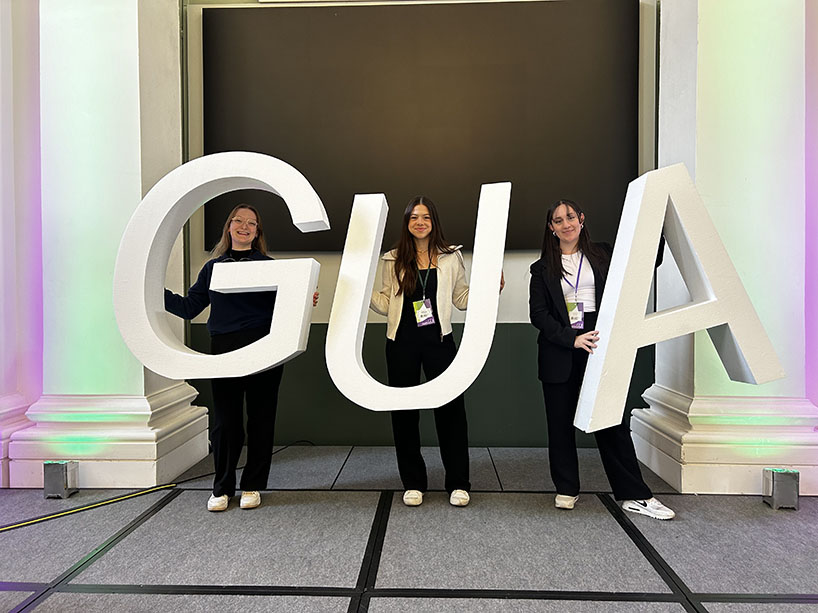
On Nov. 10, students from across Canada, including a handful from TMU, went to Dublin to celebrate their achievements at the Global Undergraduate Awards. From left: Margaret Steinbach, Performance Production; Vanessa Tiberio, Journalism; and Gabriella Simonelli, Master of Management of Applied Science at Western University. Credit: Vanessa Tiberio.
Vanessa Tiberio, a fourth-year journalism student with a focus on politics and public relations, is challenging the way Western media shapes Indigenous and political narratives.
For most journalism students, the pursuit of a story begins with a question. For Vanessa Tiberio, it's not just the stories we tell—it’s about who gets to tell them. Tiberio has spent the past few years at TMU exploring the intersections of media, power and resistance in Canadian media. Now, the Global Undergraduate Awards (external link) , which took place in Dublin, honoured her, along with 13 other TMU students for their outstanding research.
The Global Undergraduate Awards, the world's leading academic awards program, recognizes top undergraduate work, shares this work with a global audience and connects students across cultures and disciplines.
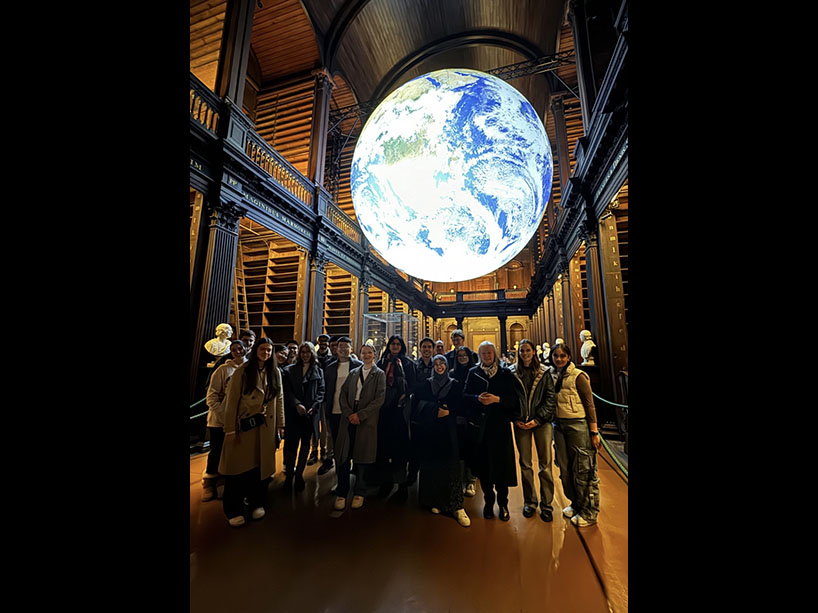
14 TMU graduates were honored for their innovative research at the Global Undergraduate Awards, a prestigious program established in 2012 to highlight the transformative impact that student research can have globally.
“I extend my warmest congratulations to these students for their perseverance, dedication and exceptional talent," said Jen McMillen, vice-provost, students. "This global recognition highlights the meaningful and creative achievements of TMU undergraduates. The outstanding quality of their work is truly inspiring and represents a significant contribution to the world of academic scholarship.”
We spoke with three of the 14 winners from TMU to learn about their academic work, their response to receiving the prestigious award, and how this recognition has shaped their future aspirations.
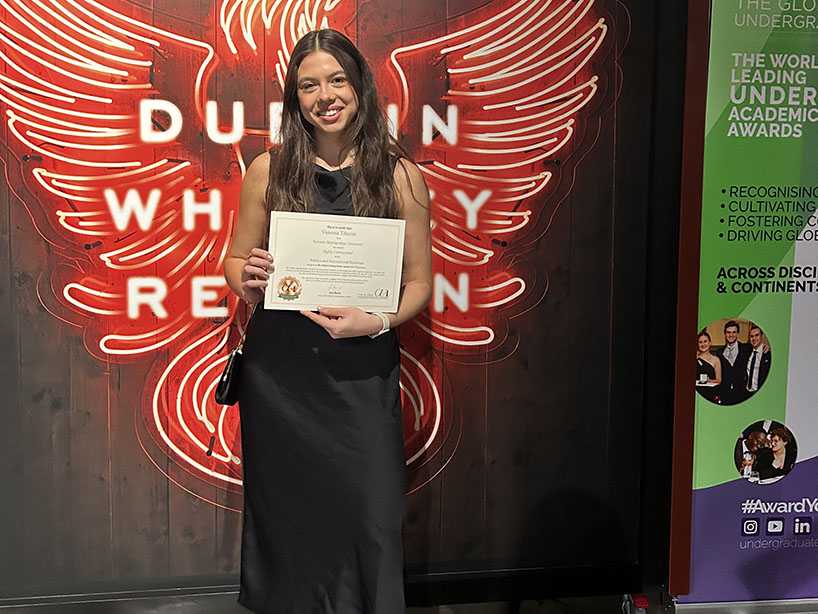
Vanessa Tiberio's research explores Canadian news media's colonial bias, using the Idle No More Movement to reveal media power imbalances and their effects on societal views and Indigenous resistance.
Program: Journalism
Commendation: Highly Commended
What started as a typical writing assignment for Vanessa Tiberio earned her a prestigious award and the opportunity to travel to Dublin, Ireland to accept it. “I was thrilled when I got the news. I felt great knowing that my work was recognized, especially for a piece I was proud of—one that truly reflects my journalism.”
In her submission, titled Power Imbalances: The Misrepresentation of the Idle No More Movement by News Media, Tiberio explains, “The Idle No More movement wasn’t just a protest—it was a conversation about power,” a reflection drawn from a paper she wrote during her third year.
Her research explores the misrepresentation and underrepresentation of Indigenous peoples in Canadian news media, highlighting how dominant narratives often perpetuate stereotypes and misinformation. Through an examination of the Idle No More movement, Tiberio finds how media coverage shapes societal perceptions of Indigenous communities, often through a colonialist lens. She analyzes the asymmetrical power dynamics in media using theories of communication power, networked society, and concepts of Indigenous resistance to understand why these movements are often misunderstood.
“I wanted to understand how the news media itself could perpetuate power structures, especially when it comes to Indigenous issues,” she explains. “When I approached this, my main goal was to explore how the media holds power. As someone entering the journalism industry, I wanted to reflect critically on both myself and the field to ensure I approach my work with a thoughtful and ethical perspective.”
Tiberio, an aspiring journalist eager to secure a place in the newsroom, is set to finish her fourth year at TMU while interning at the Toronto Star.
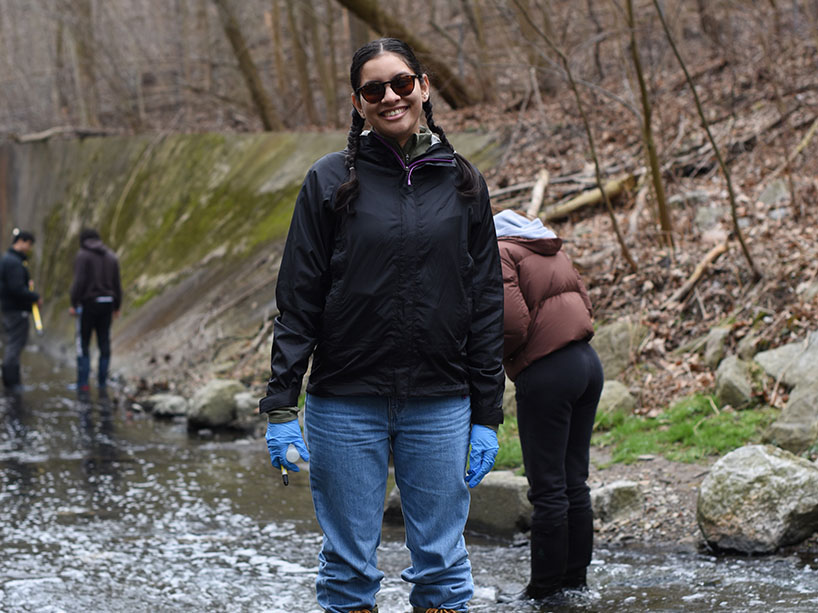
Kelsey Hazel’s research helps to further research to develop an innovative berry-growing system that could revolutionize how fruit is grown in Canada and around the world.
Program: Biology
Commendation: Highly Commended/Regional Winner
Kelsey Hazel’s passion for natural sciences was sparked during her childhood in Guyana, where she cultivated a deep appreciation for biology. After moving to Canada in 2019, she pursued her interests at TMU starting in 2020.
“Winning this award was such an unexpected honor,” Hazel said. “The research process was long and full of challenges, which is just part of being a scientist. Receiving this award felt like a meaningful way to wrap up my undergraduate journey. It also gave me a sense of professional validation, recognizing the significance of my work and its real-world applications.”
As a TMU biology major, Hazel researched optimizing hydroponic systems for raspberry cultivation. Her paper, Investigating the Yield and Light Penetration Impacts of Novel Pot and Trellis Designs in Above- and Below-Ground Competition in Raspberries, explores innovative methods to reduce food waste and improve urban fruit production in cities like Toronto.
Amid rising food insecurity in Canada post-COVID-19, Hazel ’s research tackles critical agricultural challenges by optimizing vertical hydroponic systems for sustainable urban farming. Under the guidance of TMU professor Leslie Campbell at Campbell Labs, she explored ideal growing conditions using raspberries as a proof of concept. Her work focuses on maximizing yield, reducing transportation costs, and improving efficiency through innovative trellis and pot designs, demonstrating how year-round farming can minimize land use, labour and environmental impact. Campbell Labs continues to advance this transformative research.
Now pursuing a master’s in environmental science at the University of Toronto, Hazel builds on her undergraduate research by studying aquatic and terrestrial biosystems. She credits mentorship and community support for her academic success at TMU. “The most valuable part of my undergraduate experience was the sense of community—the support from professors, peers, and the guidance I received. My professors, especially Dr. Campbell, were incredibly helpful in offering advice and encouragement.”
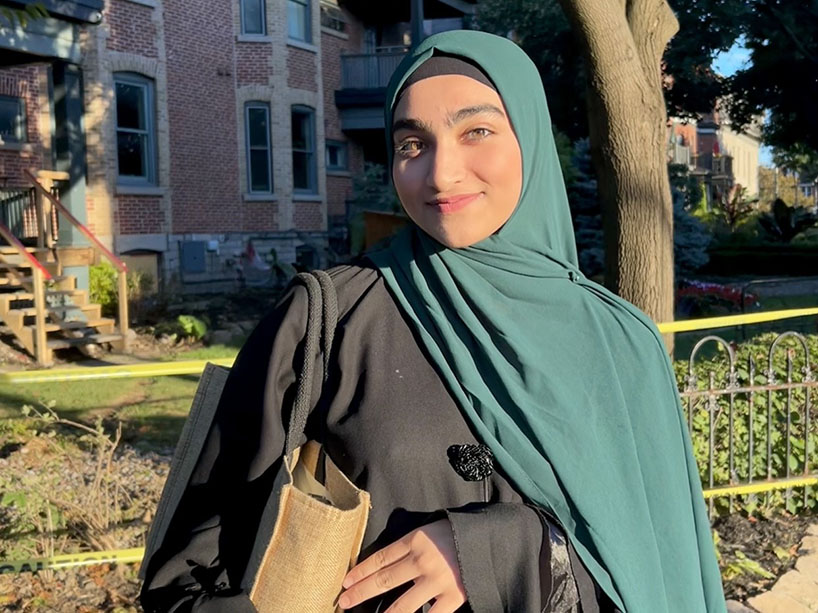
Hafsah Younus, a Pakistani-Canadian and the first in her family to attend post-secondary education, received a Global Undergraduate Award for her criminology project on the role of trust in organized crime.
Program: Criminology (Hons.)
Commendation: Highly Commended
Hafsah Younus, the first in her Canadian-Pakistani family to pursue post-secondary education, achieved international acclaim by winning the Global Undergraduate Award for her criminology research. Her project, titled The Role of Trust in Organized Crime, Terrorism, and State Institutions, explored the critical role of trust in the emergence and operation of organized crime.
“I’m so grateful. This recognition has validated my research and my decision to pursue this topic for my master’s degree and beyond,” says Younus. “Initially, I saw my work as just a strong paper, but being acknowledged globally showed me its significance and motivated me to continue in my research.”
As a recent TMU graduate with a bachelor of arts in criminology and a minor in psychology, Younus's passion for understanding societal structures was sparked during a fourth-year seminar course.
Her research examines the mechanisms of trust across three complex domains: organized crime groups, terrorist organizations and state institutions.
"It all comes down to trust," Younus explains. "It shapes how relationships are formed, sustained, and even fractured. By studying how trust operates in various contexts—how it’s maintained, eroded and theoretically applied—we gain deeper insight into its impact on governance, social cohesion, and even the dynamics within organized crime and terrorist groups.”
Through her work, Younus seeks to provide critical insights for policymakers, law enforcement and academics. Her research underscores the vital role trust plays in shaping relationships and systems worldwide, from illicit networks to governmental frameworks. By analyzing these contrasting dynamics, Younus aims to provide insights that are pivotal for policymakers, law enforcement agencies, and scholars working toward societal stability, governance and security.
Currently pursuing her master's degree at the University of Ottawa, Hafsah aspires to shape policy-making by promoting legislative frameworks that are inclusive and equitable, ensuring they do not discriminate against any racial, religious or demographic group.
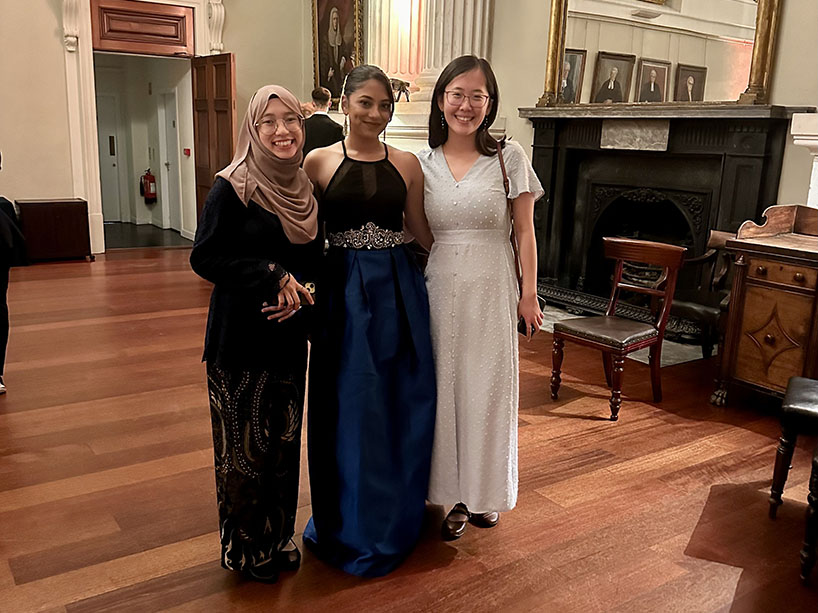
TMU students that attended the Global Undergraduate Awards in Dublin had the opportunity to connect with peers from around the world, fostering international collaboration and exchange. From left: Haajar Binte Arman, Nanyang Technological University (Asia); Anjali Singh, Psychology (TMU); Nan Sophia Han, Karolinska Institutet (Europe).
There were 14 TMU students recognized at the Global Undergraduate Awards this year:
- Regional Winners/Highly Commended:
- Kelsey Hazel, Faculty of Science
- Yerza Hussain, Faculty of Arts
- Bryson Landriault, Faculty of Arts
- Chau Nguyen, The Creative School
- Margaret Steinbach, The Creative School
- Highly Commended:
- Jessica Adelson, The Creative School
- Kielon Gerra, The Creative School
- Alyssa Krogh, Faculty of Science
- Ayshin Mehrabi, Faculty of Science
- Sebastian J. Neme, Faculty of Arts
- Anjali Singh, Faculty of Arts
- Vanessa Tiberio, The Creative School
- Hafsah Younus, Faculty of Arts
- Yang Zeng, The Creative School
Related stories: